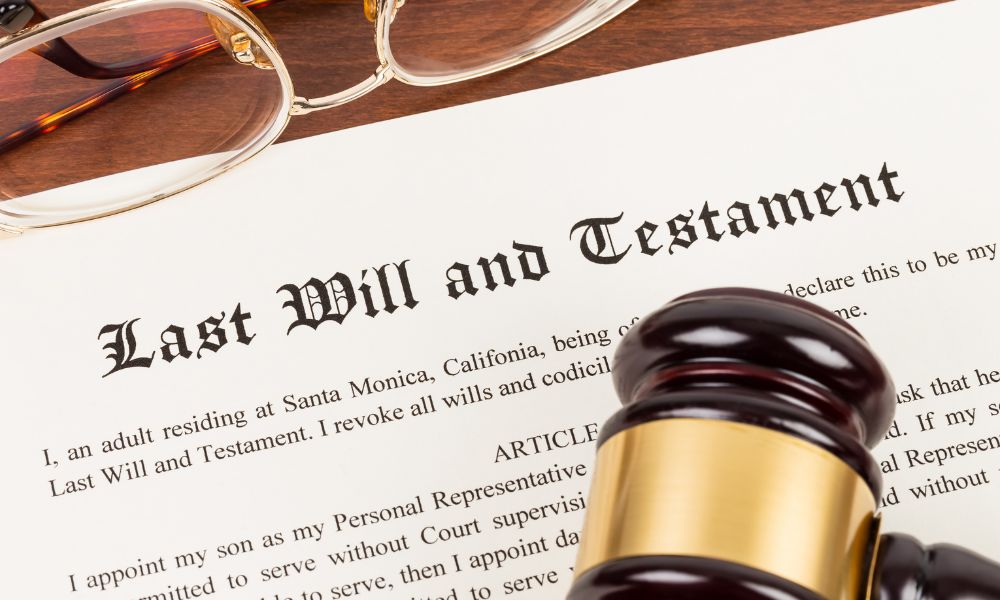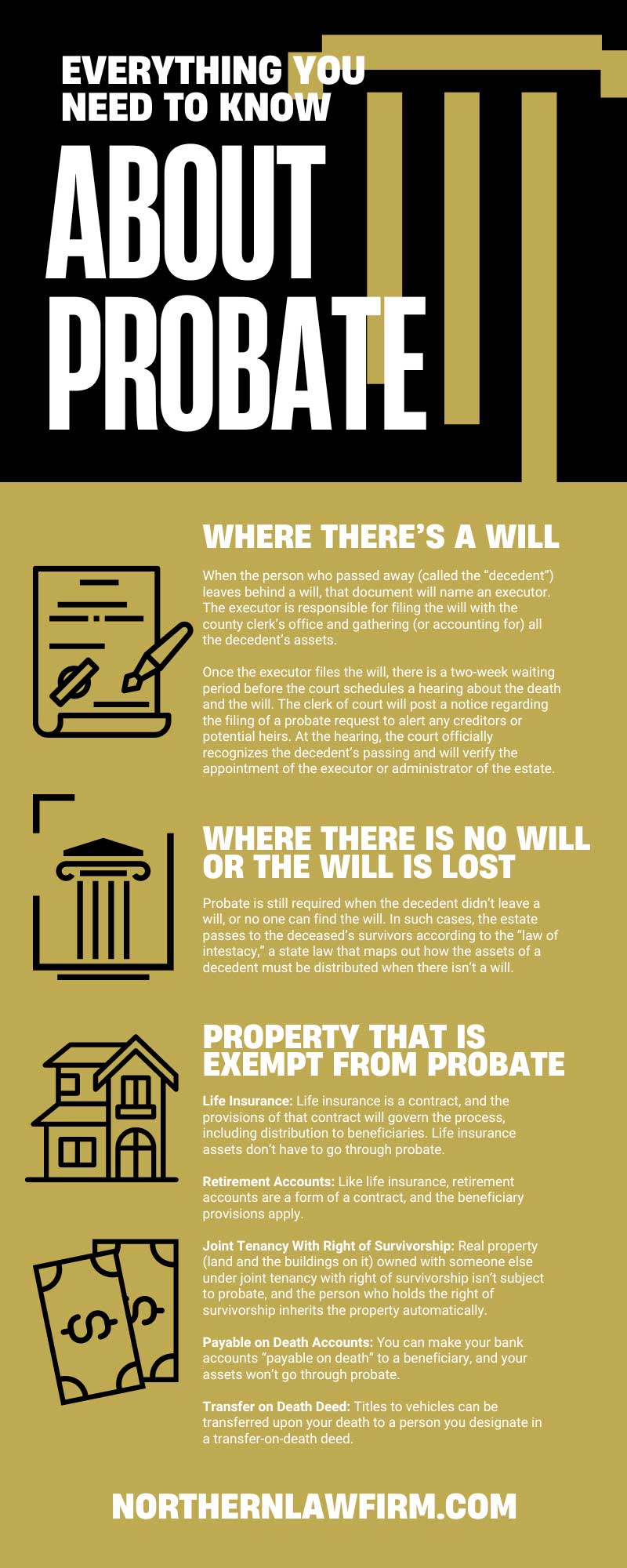When someone dies in Texas, those left behind need a legal way to distribute that person’s assets and resolve their debts. That procedure is known as probate. The probate process in Texas is fairly straightforward and helps heirs and survivors follow their loved one’s wishes about what should happen to their assets after they die.
Probate is also necessary when someone dies without leaving a will. The court sorts out the person’s property and debts to ensure the proper distribution of property and reconciliation of debts. Probate also protects the interests of named beneficiaries and creditors of the deceased. If you’re confused about how the process works, here’s everything you need to know about probate in the state of Texas.
Where There’s a Will
When the person who passed away (called the “decedent”) leaves behind a will, that document will name an executor. The executor is responsible for filing the will with the county clerk’s office and gathering (or accounting for) all the decedent’s assets.
Once the executor files the will, there is a two-week waiting period before the court schedules a hearing about the death and the will. The clerk of court will post a notice regarding the filing of a probate request to alert any creditors or potential heirs. At the hearing, the court officially recognizes the decedent’s passing and will verify the appointment of the executor or administrator of the estate.
The executor then compiles an inventory of all the decedent’s assets and files it with the court. The inventory must be a detailed listing of all the property left behind and its value. This may require an executor to obtain professional appraisals of the property and prepare careful descriptions of all the assets.
The next steps include identifying all beneficiaries and creditors and resolving disputes. If someone believes the will is a forgery or was made under the influence of a third party, there are several versions of a will, or the will wasn’t made or signed correctly, they can ask the court to resolve the issue by contesting the will within two years of the beginning of the probate process.
Courts prefer that individuals settle disputes over wills through mediation. Sometimes families and other beneficiaries are able to settle their disputes out of court and without mediation.
Once disputes are settled to the court’s satisfaction, the court moves on to ensure that the decedent’s creditors are paid from the estate’s assets. Then, the court oversees the distribution of assets to the beneficiaries named in the will.
The executor can request an independent administration if the will if the will allows it or doesn’t specify. In an independent estate administration, the executor will distribute the assets according to the will without court supervision. The executor must publish a probate notice as a way to inform creditors of the decedent’s passing and must file an inventory of the decedent’s assets, but after that, the executor can pay the debts and distribute the remainder of the estate.
Where There Is No Will or the Will Is Lost
Probate is still required when the decedent didn’t leave a will, or no one can find the will. In such cases, the estate passes to the deceased’s survivors according to the “law of intestacy,” a state law that maps out how the assets of a decedent must be distributed when there isn’t a will.
Under the law of intestacy, a surviving spouse usually inherits all the marital (community) property and one-third of the decedent’s separate property (if there was any). The spouse also gets the use of any real estate that had been held as community property. If the decedent and the surviving spouse had children who are all their legal children, those children receive two-thirds of the decedent’s separate property.
If the decedent and their spouse had a child who died before the decedent, that child’s share of the separate property passes to their children under a rule called per stirpes. Per stirpes is Latin for “by branch” or “by roots.” It means that the decedent’s grandchildren will split their deceased parent’s share of the separate property evenly. Often, when there is a will, it will say that certain assets are to be distributed “per stirpes” to grandchildren.
If there is no surviving spouse and no surviving children, the decedent’s parents, siblings, nieces, nephews, cousins, aunts, and uncles may receive a distribution from the estate.
Whether or not you have substantial assets or a large family, you should seek the advice of an experienced Texas probate lawyer who can help prepare a proper will. This can streamline the probate process and make your wishes clear to all concerned parties.
Property That Is Exempt From Probate
An exemption exists for “small estates” worth $75,000 or less that meet several other requirements. These include the factors that the assets are more valuable than the decedent’s death and that the homestead was the decedent’s only real property.
For a small estate to avoid probate, all heirs must sign a small estate affidavit, there must be no pending application for administration of the estate, and no one must have yet been appointed as a personal representative of the estate. Such small estates don’t need administration, and if the court accepts the small estate affidavit, the estate need not be probated.
Other types of property that are exempt from the probate include:
Trust Property: The most common way to avoid probate is to place all your assets into a living trust. You will be the trustee until you die or become incapacitated, at which point your designated successor trustee will take over and administer your assets according to the trust provisions.
Life Insurance: Life insurance is a contract, and the provisions of that contract will govern the process, including distribution to beneficiaries. Life insurance assets don’t have to go through probate.
Retirement Accounts: Like life insurance, retirement accounts are a form of a contract, and the beneficiary provisions apply.
Joint Tenancy With Right of Survivorship: Real property (land and the buildings on it) owned with someone else under joint tenancy with right of survivorship isn’t subject to probate, and the person who holds the right of survivorship inherits the property automatically.
Payable on Death Accounts: You can make your bank accounts “payable on death” to a beneficiary, and your assets won’t go through probate.
Transfer on Death Deed: Titles to vehicles can be transferred upon your death to a person you designate in a transfer-on-death deed.
Texas law also provides exemptions for the homestead and up to $100,000 of assets for the surviving spouse and children of a decedent. This means that a surviving spouse with minor or adult children living in the home will not have to sell it to pay the decedent’s creditors. The court may also approve a family allowance for up to a year after the death.
Probate sounds like a complicated process, but for most Texas families, it’s more straightforward than it seems. When you’ve lost a loved one, the Northern Law Firm can help you understand everything you need to know about probate and guide you through the process.


